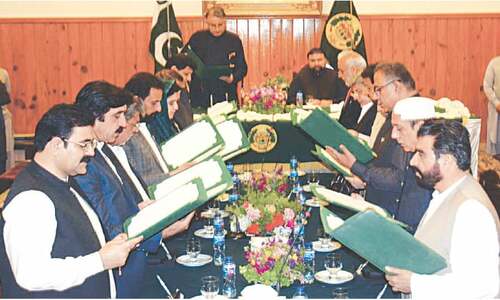ISLAMABAD: In a bid to freshen up its air and cut planet-warming emissions, Karachi will introduce cleaner-running buses powered by a decidedly “unclean” fuel: cow poo.
With funding from the international Green Climate Fund, Karachi will launch a zero-emission Green Bus Rapid Transit (BRT) network, with 200 buses fuelled by bio-methane.
Locals said the new bus system — due to start operating in 2020 — would help reduce air pollution and street noise, but doubted whether it would have enough buses to resurrect the city’s ailing transport system.
“(Karachi’s) public transport system has totally collapsed and most people have to use online taxi-hailing services (and) auto rickshaws,” said commuter Afzal Ahmed, 45, who works as a medical sales representative.
After management problems forced the Karachi Transport Corporation to fold some two decades ago, Chinese-imported buses running on compressed natural gas fell into disrepair and were taken off the road, worsening public transport woes, he noted.
Malik Amin Aslam, adviser on climate change to Prime Minister Imran Khan, said the BRT system was the first transport project the Green Climate Fund had approved, and would bring “multiple environmental and economic benefits”. It would not require operating on subsidies, he added.
Green Bus Rapid Transit network comprising 200 buses is scheduled to start next year
The cheap, clean bus network will cater for 320,000 passengers daily, and will reduce planet-warming emissions by 2.6 million tonnes of carbon dioxide equivalent over 30 years, according to project documents.
The BRT will consist of a 30km corridor that will benefit 1.5m residents, add 25 new bus stations, secure pedestrian crossings and improve sidewalks, cycle lanes and bike-sharing facilities.
The Green Climate Fund, set up under UN climate talks to provide finance to developing countries to help them grow cleanly and adapt to a warming climate, will provide $49 million for the Karachi project out of a total cost of $583.5 million.
The other major funders are the Asian Development Bank and the provincial government of Sindh, where Karachi is located.
The BRT system, to be rolled out over four years, will have a fleet of 200 hybrid buses that will run on bio-methane produced from manure excreted by Karachi’s 400,000 milk-producing water buffaloes, and collected by the authorities.
The project will prevent about 3,200 tonnes of cow manure entering the ocean daily by converting it into energy and fertiliser at a biogas plant, and will save more than 50,000 gallons of fresh water now used to wash that waste into the bay, Aslam said.
Ali Tauqeer Sheikh, CEO of Leadership for Environment and Development (Lead) Pakistan, a policy think tank, said calculating the overall impact on the environment was complex, as the buses would be introduced in stages.
Authorities often lack maintenance budgets, he noted, highlighting the risk the buses could break down and not be repaired.
Pakistan has a history that it does not utilise donors’ project funding at an optimum level, he said.
But if all goes well, Sheikh said the project, as the country’s first green BRT system, would lay the foundation for climate-smart urban transportation systems” in other places. It could shake up approaches to public transport among policy makers and planners, serving as a model for other cities, including Lahore, Multan, Peshawar and Faisalabad, he said.
The country needs to launch such projects in big cities to discourage personal vehicle use, thereby easing traffic emissions and smog, and improving air quality and public health, Sheikh added.
He recommended setting a target for 70 per cent of the urban population to use public transport.
Another way to ease air pollution would be to import better-quality petroleum fuels for vehicles, he added.
“We are importing low-grade fuel, and our refineries have capacity to refine only third-grade fuel,” he said.
Ahmad Rafay Alam, an environmental lawyer, said previous BRT projects in large cities had not focused on environmental sustainability.
Planners should start connecting transport systems with wider urban development, Alam said. “We need to introduce transport-oriented urban design by encouraging the use of public transport and discouraging the use of private vehicles to reduce emissions,” he said.
Zia-Ur-Rehman, a Karachi-based journalist covering civic issues, noted that the Sindh provincial government had run fewer than 50 buses in the city in the last 10 years, while private buses and mini-buses had dwindled from 25,000 to 8,000. One reason is that buses were torched during strikes and at times of political upheaval, he said. The new bus system alone was unlikely to resolve the city’s transport problems, but would be a short-term relief for commuters and also help in reducing... air pollution, he added.
Published in Dawn, January 3rd, 2019












































Dear visitor, the comments section is undergoing an overhaul and will return soon.